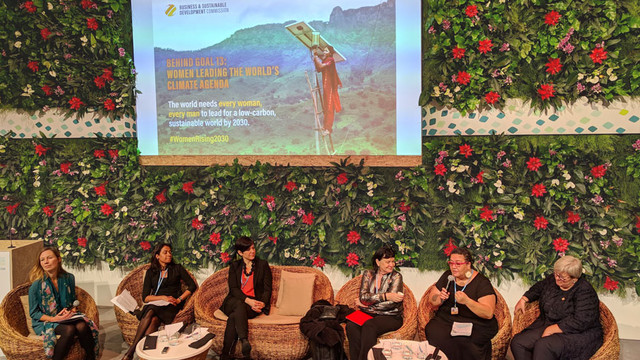Building climate negotiation skills for African officials
Officials from African countries will have the opportunity to increase their climate negotiation skills at two training workshops in Dakar in June.

Workshop participants will hear from senior LDC climate negotiator Mamadou Honadia, who headed Burkina Faso's delegation to the 2016 UN climate summit (Image: Matt Wright/IIED)
The workshops are part of an international programme designed to enable developing country negotiators to effectively access and participate in UN climate talks.
The first workshop is designed for officials and junior negotiators from Anglophone African countries and will take place from 5-9 June. The second workshop, to be held on 8-9 June, is designed for officials from Francophone African countries. Both workshops will be hosted by ENDA energie and are being organised by the European Capacity Building Initiative (ecbi).
Workshop participants will have the opportunity to hear from senior government officials, experienced climate negotiators and their advisors about the key issues for the least developed countries (LDCs) at the climate summits.
One of the speakers will be Burkina Faso's senior climate negotiator, Mamadou Honadia. Honadia has 20 years' experience of international climate negotiations, and headed Burkina Faso's delegation to the 2016 UN climate talks in Marrakech. He spoke to IIED about the importance of training young LDC negotiators.
Watch Burkina Faso's Mamadou Honadia talking about his experiences as a climate negotiator
Honadia told IIED that he feels he has a responsibility to share his experiences with young negotiators from vulnerable countries. He said: "They have been lucky compared to us, but the responsibility personally I have is to share with them what I know, in order to prepare those who would replace us two, three years ahead of us."
The responsibility personally I have is to share with them what I know, in order to prepare those who would replace us – Mamadou Honadia
Burkina Faso is one of 48 LDC countries. These nations are among the most vulnerable to the adverse effects of climate change and are often least equipped to argue their case in international talks.
Honadia first attended international climate talks in 1991. He said his first experiences as a negotiator for a vulnerable developing nation were very difficult. He said that a key problem was that he did not speak English – but he was also worried about his inexperience inadvertently causing problems.
He said: "When you start negotiating without any background, without any advice, without any skills on how the UN procedures are, it really is very difficult because, rapidly, you can create a diplomatic incident."
The first Conference of the Parties (COP) to the United Nations Framework Convention on Climate Change (UNFCCC) took place in 1995. Today, the Least Developed Countries Group collaborates effectively to put LDC issues at the forefront of the talks.
Building capacity for the future
The ecbi was launched in 2005 with a remit to support developing country negotiators. IIED is a lead partner, managing the ecbi training and support programme. The programme runs regular workshops for UNFCCC negotiators from vulnerable developing countries and offers bursaries to enable junior negotiators to develop specialist knowledge.
In 2016 IIED organised four ecbi workshops in the run-up to the Marrakech climate summit. Thirty officials from Anglophone African countries attended a regional climate negotiation workshop in Tanzania in September, and in November Honadia was one of a range of experts who spoke at a pre-COP ecbi workshop for junior climate negotiators.
Janna Tenzing from @IIED doing a q&a with senior LDC Negotiator Mamadou Honadia from Burkina Faso @COP22 pic.twitter.com/50UJrtVfHo
— Saleemul Huq (@SaleemulHuq) November 5, 2016
Negotiators trained by ecbi in regional and pre-COP workshops have risen not only to become senior negotiators in the UNFCCC process, but also leaders of regional groups and of UNFCCC bodies and committees, and ministers and envoys in their home countries. These ecbi alumni are now capacity builders themselves, aiding the initiative's efforts to train and mentor the next generation of negotiators.
Honadia now works in the prime minister's office in Burkina Faso, dealing with the Green Climate Fund. He still values the opportunity to share his experiences. He said: "I think it's very important because other people are still vulnerable to climate change. We are poor countries. We still need some strong young fellow(s) to continue the fight we have started."
IIED is a lead partner European Capacity Building Initiative, managing the training and support programme in collaboration with Oxford Climate Policy. The work is backed by funding from the German government's International Climate Initiative.




